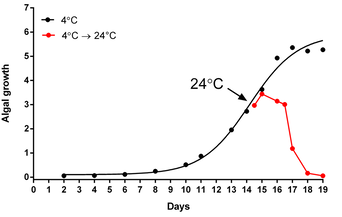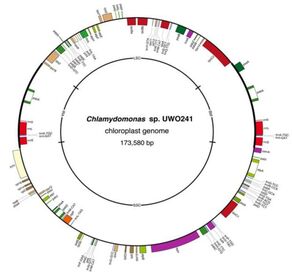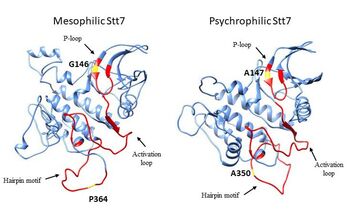Psychrophilic green algae

Psychrophiles are obligate extremophiles that thrive in the cold but can not survive moderate temperatures. The study of these extremophiles is an exciting new field and these unusual organisms can help us understand how life evolves and adapts to some of the most extreme environments on our planet. Psychrophiles are also recognized as an important source of novel metabolites and enzymes that contribute to survival at low temperatures and can even provide clues to possible life on other planets (exobiology). Antarctic green algae from the order Chlamydomonas are excellent models for investigating the evolution, physiology and biochemistry of photosynthesis at frigid conditions. Read more here: Cvetkovska et al, 2017.
Current projects:
 Psychrophilic algae undergo severe stress and cell death when exposed to moderate temperature
Psychrophilic algae undergo severe stress and cell death when exposed to moderate temperature
Environmental stress
Polar algae are exceptionally well adapted for life at extreme conditions but are sensitive to environmental stress, and are particularly threatened by global climate change patterns. In our lab we study how environmental stress affects the biology of psychrophilic algae, from the effect on individual protein activity and stability to whole organismal physiology. Our goal is to reveal adaptive strategies and to investigate how psychrophilic algae will respond to a changing climate.
Read more in our recent preprint Cvetkovska et al (Authorea)
Polar algae are exceptionally well adapted for life at extreme conditions but are sensitive to environmental stress, and are particularly threatened by global climate change patterns. In our lab we study how environmental stress affects the biology of psychrophilic algae, from the effect on individual protein activity and stability to whole organismal physiology. Our goal is to reveal adaptive strategies and to investigate how psychrophilic algae will respond to a changing climate.
Read more in our recent preprint Cvetkovska et al (Authorea)
 The chloroplast genome of the Antarctic alga Chlamydomonas sp. UWO241
The chloroplast genome of the Antarctic alga Chlamydomonas sp. UWO241
Photosynthesis at low light
Polar algae are often exposed to unusual light conditions with continuous light during the austral summer and darkness during the winter. Algae that thrive under the polar ice are also adapted to extreme shading even in the middle of the polar summer and light limited to blue-green wavelengths. We are particularly interested in how polar algae synthesize chlorophyll and how their physiology changes under different light conditions.
Read about our work using Chlamydomonas sp. UWO241 as a model.
Cvetkovska et al, 2018; Smith et al, 2019
Polar algae are often exposed to unusual light conditions with continuous light during the austral summer and darkness during the winter. Algae that thrive under the polar ice are also adapted to extreme shading even in the middle of the polar summer and light limited to blue-green wavelengths. We are particularly interested in how polar algae synthesize chlorophyll and how their physiology changes under different light conditions.
Read about our work using Chlamydomonas sp. UWO241 as a model.
Cvetkovska et al, 2018; Smith et al, 2019
 Subtle differences in protein sequence lead to major differences in protein activity
Subtle differences in protein sequence lead to major differences in protein activity
Psychrophilic proteins: evolution and biochemistry
Enzyme reaction rates are severely decreased at low temperature, which is the likely culprit of the inability of most microbes to survive prolonged cold. Psychrophiles overcome this limitation by 1) Efficient synthesis of large enzyme quantities and 2) Evolving cold-adapted enzymes, that have and high activity at low temperatures at the expense of lower thermostability at moderate temperatures. We study protein quality control, evolution and biochemistry of cold-adapted enzymes in psychrophilic algae.
Read more on cold-adapted ferredoxin (Cvetkovska et al, 2018), the kinase STT7 (Szyszka-Mroz, Cvetkovska et al, 2019), and gene duplication as potential mechanism that can lead to higher protein amounts (Zhang et al, 2021).
Enzyme reaction rates are severely decreased at low temperature, which is the likely culprit of the inability of most microbes to survive prolonged cold. Psychrophiles overcome this limitation by 1) Efficient synthesis of large enzyme quantities and 2) Evolving cold-adapted enzymes, that have and high activity at low temperatures at the expense of lower thermostability at moderate temperatures. We study protein quality control, evolution and biochemistry of cold-adapted enzymes in psychrophilic algae.
Read more on cold-adapted ferredoxin (Cvetkovska et al, 2018), the kinase STT7 (Szyszka-Mroz, Cvetkovska et al, 2019), and gene duplication as potential mechanism that can lead to higher protein amounts (Zhang et al, 2021).
